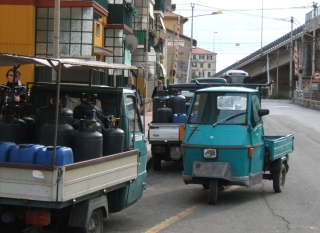The arrival of Autumn here in Torri has finally brought a slight lowering of temperature and nature is at last showing signs of her preparation for Winter. Just as in Britain, we have had an exceptional period of weather here, in our case much dryer than the norm. Our walks now take us through a painted landscape, still the dark greens of olive and conifer but dotted about now are bright yellows of less common deciduous shrubs, colour which in the course of the coming weeks will disappear as the leaves fall.
Our most recent jaunt took us from the quiet and barely accessible village of Collabassa, perched high between the Bevera and the Roya valleys, and along a mountain ridge to Olivetta, a better cared for village with freshly painted houses and murals like this one opposite the village grocery store.
Clearly there is a spirit present in some villages, absent in others, that brings colour and artistry for the enjoyment of the residents and, of course, for us visitors. This village sits just inside Italy and a tiny road zigzags its way into France from here.
Clearly there is a spirit present in some villages, absent in others, that brings colour and artistry for the enjoyment of the residents and, of course, for us visitors. This village sits just inside Italy and a tiny road zigzags its way into France from here.
Our path runs somewhat lower, broadly following the line of a ridge separating the Bevera and Roya valleys, the twists and turns taking us first high above one river then the other. It is steep and exposed in places, rough underfoot and damp in corners where the sun doesn't reach but arid it is not. Much of the vegetation alongside our path is tough and spiky, shrubs that we half-recognise but with weapons or armour not found on British varieties.
Fruits and berries abound, most of which we don't recognise and leave well alone, but here and there are small trees with round orange fruits like large marbles but soft and sweet inside a granular skin. We think these are lychees but as yet nobody has been able to give us the local name (suggestions anyone?). They grow alongside our path, a fast-food convenience for us as we stroll along although it may be a mistake to eat too many as there is something in them that accelerates digestive transit.
Fruits and berries abound, most of which we don't recognise and leave well alone, but here and there are small trees with round orange fruits like large marbles but soft and sweet inside a granular skin. We think these are lychees but as yet nobody has been able to give us the local name (suggestions anyone?). They grow alongside our path, a fast-food convenience for us as we stroll along although it may be a mistake to eat too many as there is something in them that accelerates digestive transit.
We traverse a steep slope which has been devastated by fire not long before, the conifers standing charred and lifeless, the pale soil exposed to the sun athough ants are already making new homes for themselves. The contrast is sudden, from green and gold to brown and charred, but the path remains intact here so we pass unhindered.
Further on we hover above the town of Airole, still sunlit despite the long shadows and beneath which, in a long tunnel, runs the railway line heading north towards French and Italian alpine ski resorts. We are close to the border which follows natural features, ridges and summits, twisting and turning east and west oblivious to the demands of modern man. High in the mountains, of course, there is nothing to show ownership or nationality, nothing to mark which laws hold sway.
Further on we hover above the town of Airole, still sunlit despite the long shadows and beneath which, in a long tunnel, runs the railway line heading north towards French and Italian alpine ski resorts. We are close to the border which follows natural features, ridges and summits, twisting and turning east and west oblivious to the demands of modern man. High in the mountains, of course, there is nothing to show ownership or nationality, nothing to mark which laws hold sway.
By contrast, travelling by road closer to the coast there is a strange feeling of unreality when one passes between Italy and France and the language of the road changes - 'servizio' (motorway services ) become 'les aires', 'peddagio' (tollbooth) becomes 'péage' and 'il semaforo' (traffic lights) become 'les feux'. Roadside markers change shape, crash barrier design is different and even the roadway markings are not painted the same colour. Next week we have been invited to the Lyon home of our French friend, Guy. Although he regards himself as French, at least half his parentage is Italian and his surname is shared by many in Torri. This trip promises to be an intensive French language and cultural experience for us but he is kind and sensitive (il a sensibilité) and anyway, life is too short to miss such an opportunity.










